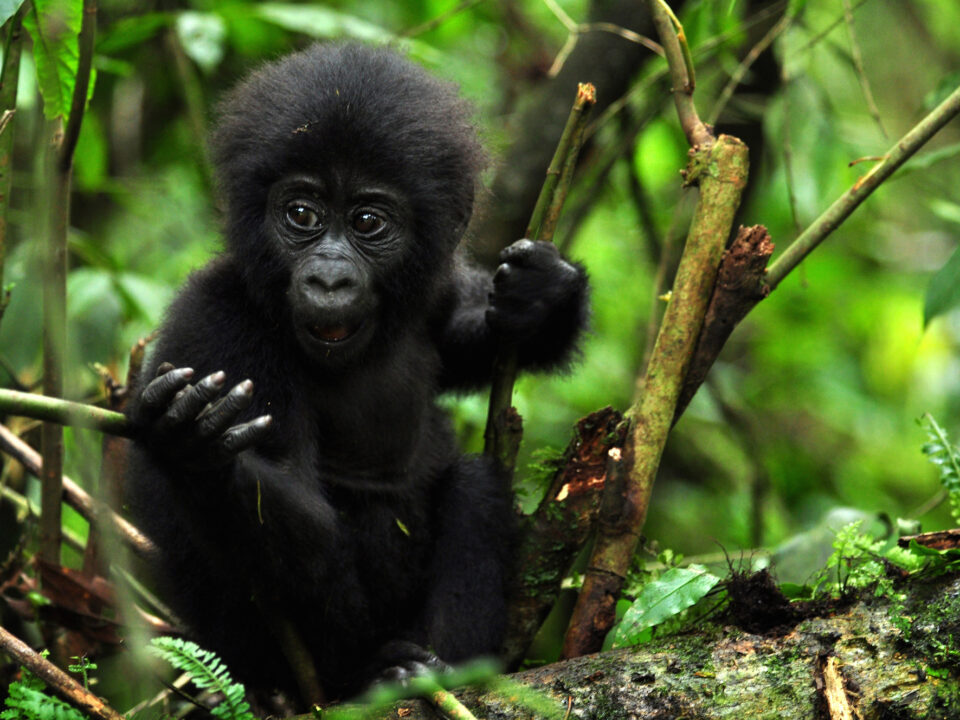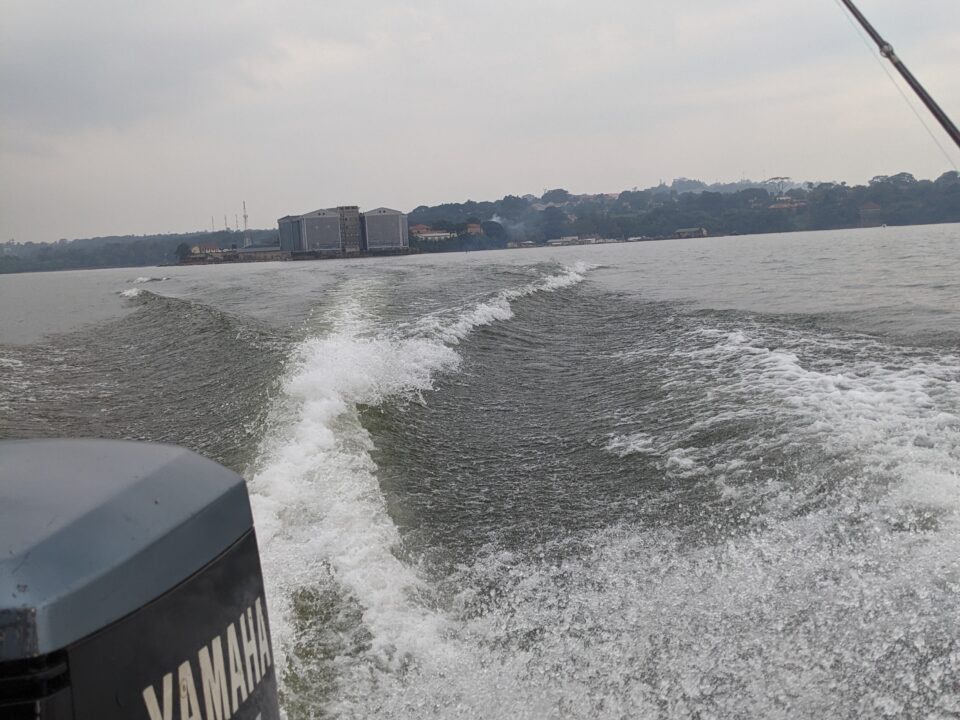
NEED TO KNOW
Rwanda is a small, landlocked country in eastern/central Africa of approximately 26,340 sq. km. It has five prominent volcanoes 23 lakes and several rivers. A large part of the country has an elevation of between 1,500 and 2,500 meters.
The highlands in large parts of the country are now dominated by the terraced agriculture that gives the Rwandan countryside its beautiful and pleasant character. Average temperatures are between 24–27deg with the hottest months from Aug–Sept.
Official Rwanda languages; Kinyarwanda, French, English & Kiswahili
Practical Information Before You Travel To Rwanda
Before you make your journey to majestic Rwanda, use the information featured in this section to plan your trip and make the most of your time here, information ranges from; entry requirements, safety tips, and how to get around to weather conditions, currency, and accommodations. Your trip planning starts here and we’ve got you covered!
CURRENCY
Local Currency: Rwanda Franc (RWF). Approximately Rwanda Franc 833 = 1 US Dollar (January 2019)
ENTERING RWANDA
You have to present your identification documents when entering Rwanda, like your ID card or passport and, depending on your country of origin, a stamped visa. The visa documentation MUST BE DONE in before your arrival irrespective of whether you fly in or drive there.
You are advised to ensure that your passport is valid for a minimum of six months and has several clear pages for visas before departure. If you are traveling on a British Passport new regulations require that your passport is valid for 12 months for entry into Rwanda. It is suggested that you check your status as regards visa before traveling with your agent or Outback Adventure Safaris; they change regularly, and some of these state embassies will INSIST you get one before travel, whereas they may be freely available on arrival.
AUSTRALIA, GERMANY, ISRAEL, NEW ZEALAND, SOUTH AFRICA, SWEDEN, UK, AND the USA are issued with a Rwandan entry visa upon arrival without prior application. The single-entry visa fee is $30 and is valid for 30 days while the multiple-entry visa costs $ 50.
Nationals of SINGAPORE, HONG KONG, MAURITIUS, AND PHILIPPINES are exempt from entry/tourism visas for a stay of up to 90 days. EAC nationals will be issued with a 6-month visitor pass (renewable) at entry points with no fee.
All other nationalities will be required to purchase visas with the cost varying, depending on the nationality, up to USD60 for a single entry. These countries should apply for a visa BEFORE traveling and pay the pre-subscribed fee.
For more information about entering Rwanda, visit www.migration.gov.rw
All visitors/tourists (by road and air) who are not eligible for the free 90-day entry into Rwanda or able to get their visa upon arrival without prior application are required to complete an “entry facility application” on the Rwandan immigration authority’s website under the topic “Public service” click on “entry facility” and on the form, that appears clients fill in the basic details like name, passport number, arrival date and port of arrival – and submit it over the web. Clients should process this application as soon as possible to allow plenty of time for the application to be approved. It’s good for clients to print out a copy of their submission in case their copy is not at the visa counter when they arrive.
TRAVEL INSURANCE
It is strongly recommended that you are covered by some type of medical insurance before you grab that flight for the Rwanda Gorilla Trekking Tour experience. Talk to your travel consultant about this. Should you require further information please do not hesitate to contact us. Minimum cover is recommended to be at least $80 for medical and related expenses.
HEALTH
Yellow Fever Vaccination is a requirement when traveling between East African countries, and should you be flying into SA after visiting East Africa. This must be done no later than 10 days before your departure.
Typhoid may be requested from the authorities when crossing into Rwanda, although such a request is unusual. This can be done by your local GP or through a travel clinic. The tablet form of the vaccine is also available in certain pharmacies.
Tetanus is also recommended, as is Cholera, but is not compulsory.
Hepatitis Vaccination is at the discretion of the traveler. If you have a history of liver disorders (hepatitis etc.) you must consult your physician first.
Malaria prophylactics are a must and can be purchased from your local pharmacy. Please consult your pharmacist/doctor. It is also a good idea to bring some insect repellent with you to spray on yourself in the evenings and early morning when mosquitoes tend to be about.
Diarrhea. Good personal hygiene and control over the quality of your drinking water to avoid this, bottled water is readily available throughout the country, but take along some medicine in case, particularly if you are planning to spend some time traveling alone and not with a tour operator. We recommend that guests either buy bottled water or take along water purification tablets and look after their drinking water.
As with all medical requirements, your doctor or travel clinic will provide the most up-to-date information; the above is a guide only.
PRIMATE TRACKING HEALTH REQUIREMENTS
Mountain gorillas and Chimpanzees are highly susceptible to human diseases including flu and colds. If you are participating in a gorilla/chimp trek then you need to be free of any visibly contagious diseases and this is checked at the start of the trek by the Park Authorities. If they are in any doubt of your condition, they reserve the right to prevent you from continuing on the trek. Our advice is that if you feel you are worried about this aspect, please inform your safari guide as soon as possible, and he will seek advice as to the best way to manage the situation.
WEATHER
Live updates on weather in Rwanda are available here: Rwanda Weather
FLIGHT INFORMATION
Live updates on flights in Kigali International Airport, Rwanda are available here: Kigali Airport Live Data from Airline
LUGGAGE AND IMPACT TRAVEL
Please note that due to limited space in our vehicles, we kindly request that you bring along only essential luggage.
We recommend using a barrel or a soft bag with a maximum weight of 15 kg for your main gear, in addition to a smaller camera bag or day pack that can fit inside the vehicle.
Please avoid using hard bags, suitcases, or Samsonite bags, as they make packing very difficult.
If you are traveling internationally with one of these bags, we recommend that you repack your Safari Tour items into a soft bag before the safari and leave the hard bag at your return point.
CHARTERS LUGGAGE ALLOWANCE

cabin of a cessna caravan aircraft
If you plan to travel on a light aircraft in Rwanda, it’s important to note that the luggage allowance depends on the total weight of both the passengers and their luggage.
The restrictions vary depending on the type of aircraft and the route taken, but generally, the limit is around 10kg per person for soft bags.
This limit is strictly enforced for safety reasons. We advise you to check your luggage allowance when you confirm your itinerary and aircraft to avoid any inconvenience.
GORILLA TREKKING CLOTHING IN RWANDA
When traveling to Uganda or Rwanda, it’s crucial to be prepared for all four seasons. As it tends to rain often in the mountainous regions, we highly recommend packing lightweight rain gear for your hike to see the gorillas.
During an African safari, it’s important to respect cultural norms and dress modestly in rural villages or markets by covering your knees and shoulders. Formal dress is not required at any of the lodges or hotels, with casual or smart casual attire being the norm depending on the level. In towns and cities, or more upscale lodges and hotels, it may be more appropriate to wear long pants and a shirt or golf shirt, especially in the evenings. Women should keep cultural norms in mind and dress accordingly.
When on safari, it’s best to wear neutral, bush gear such as greens and khakis to blend in with the surroundings. Bright colors should be avoided, especially blue, in areas where tsetse flies are present. During the day, shorts or lightweight trousers, t-shirts, a hat, and sunblock are recommended due to warm temperatures ranging from 25-35°C on average. For general evening use, long trousers and long-sleeved shirts are recommended to prevent mosquito bites and keep warm.
If you’re traveling to mountainous areas such as Bwindi or Virunga, packing warm clothing like a tracksuit, fleece, or sweater is a must as it can get cool in the evenings due to the high altitude. A rain jacket or anorak is also recommended as it tends to rain often in the rainforest areas, even during the drier months. Long trousers and long-sleeved shirts are also recommended to prevent mosquito bites and keep warm.
During gorilla and chimp tracking, it’s crucial to wear comfortable, hard-wearing walking shoes or boots as the conditions can be very muddy and slippery. The terrain can also be quite steep and strenuous, so be prepared for uphill sections. Wear a long-sleeved cotton shirt and lightweight long trousers to protect yourself from the undergrowth, stinging nettles, and biting ants. It’s best to avoid tracksuit pants that can get caught on bushes and thorns, and jeans that can become heavy when wet.
Gloves are also crucial for protection against scratches while holding onto vegetation for support through dense areas of the forest. Remember to tuck your long pants into your socks or boots to avoid biting insects. Keep in mind that your clothes will likely get very muddy and may not recover to their original state, so it’s best to bring old clothing for gorilla trekking.
IMPACT TRAVEL
Previous guests of Outback Adventure Safaris have suggested that if you want to help the less fortunate people of Rwanda, you can bring along any used clothes, shoes, or other items that you no longer need. These items can be donated to appropriate organizations and places. If you are interested in this option, please inform Outback Adventure Safaris before your trip.
We can arrange for you to visit an orphanage or school during your safari in Rwanda, where you can assist or donate something specific. Alternatively, we can refer you to various organizations that we work with for different community assistance and uplift programs.
We will ensure that the right people receive the appropriate funds. However, handing out money (except as genuine tips), sweets, pens, etc. is highly discouraged. It creates a culture of begging and often leads to conflicts among children when there is not enough to go around.
SAFETY TIPS
Ensuring your safety and well-being is our topmost priority. We advise you to take care of all your belongings at all times to avoid petty theft and pickpocketing, particularly near markets or in the center of Kampala, Entebbe, or Kigali. When visiting Rwanda or Uganda, here are some tips to help you have a safe and enjoyable experience:
– Look after your bags and suitcases to avoid theft, just like in any other major city in the world.
– Carry copies of all your essential documents, including your passport.
– Avoid walking alone at night on the outskirts of towns.
– Keep your valuables and cameras safe by ensuring all windows are closed when leaving the vehicle in towns. Do not flaunt flashy or valuable items while walking on the streets, particularly cash, traveler’s cheques, and credit cards. Keep them on your person at all times. A “moon bag” or “body belt” is a useful item for storing cash and other small valuable items.
– Always carry a map with you and the address of the place you are staying at.
– If you travel to places far from cities, carry a first-aid kit with you, along with the names of the medication you may require, in English.
– When staying at lodges/hotels, we highly recommend that you keep your money and valuables with you or utilize the safekeeping facilities provided. Before leaving for a new place, make sure you have everything packed and check your room.
ACCOMMODATION AND TRANSPORT
If you’re going on a safari or tour with Outback Adventure Safaris in Rwanda, your accommodation may vary from high-end to medium-class depending on the style of your trip.
There are many types of accommodations available, ranging from large hotels to smaller lodges and tented camps. You can find all the details about the places you’ll be staying in your personalized itinerary or by checking out Accommodation.
If you choose to stay in more modest local hotels or guest houses, you’ll have access to showers and toilets, but hot water can’t always be guaranteed. These establishments are generally clean and staffed by friendly and helpful people. They’re mostly used by local businessmen since not many tourists pass through these areas.
They can be noisy, particularly on weekends, but the atmosphere is welcoming and inclusive. The food is typically hearty African fare, and occasionally, European or Western dishes may be available.
SAFARI ROAD CONDITIONS IN RWANDA
While traveling through Rwanda, you will be mostly on tarred roads and they are in reasonably good condition by African standards. There may be some VERY LONG days in the vehicle, but the interesting and diverse lush scenery generally makes up for it! However, there are some really bad dirt road sections, especially in the more mountainous areas. In these areas travel will be slower, quite bumpy and there could be a lot of dust experienced en route. There are options for scheduled or charter flights for the longer routes – please enquire about prices and the feasibility of this.
The Outback Adventure Safaris Vehicles you will be traveling in our customized 4×4 vehicles that have been converted for local conditions; they have good leg room and seat between 4-7 persons, depending on the seating configuration, and have opening roof hatches for optimal game viewing. They are a little slower on the road than a saloon vehicle or a smaller ‘family’ 4×4 and do have air conditioning.
Your safari vehicle will generally used throughout your safari in Rwanda for traveling between destinations as well as for game drives and other activities at the lodges and within the National Parks.
PHOTOGRAPHY AND VIDEOGRAPHY IN RWANDA
There is no charge for personal filming of gorillas during the Outback Adventure Safaris Tour and other scenes with personal video cameras in Rwanda safe inside the genocide memorial.
Professional photographers, filmmakers, or media should advise us at the time of booking as special procedures are required as well as costs to be incurred for photographing and filming.
Most lodges operate on solar power and so have limited facilities for charging batteries and none at all, so come prepared with extra, just in case, and charge up wherever it is possible en route on your safari in Rwanda – do not wait until down to your last battery!
Do not photograph any government buildings, police, or military posts. Ask permission before photographing local tribesmen. For gorilla photography, a 35 – 70 mm zoom, or 50 mm fixed is usually sufficient, but you may want to carry a longer lens but remember you may well be in low light conditions.
Take fast film if using film (200-400 ASA plus), as you are not allowed to use a flash. Please check your camera beforehand to ensure you know how to turn it off manually.
For game & bird photography longer lens would be recommended 80-300mm ideally.
Do not spend all your time with the gorillas trying for the classic photograph, look around you and observe and enjoy these gentle animals.
CONSULATES/ EMBASSIES
Follow the link to the list of all Embassies & Consulates in Rwanda
NATIONAL HOLIDAYS
Follow the link to all National/Public Holidays in Rwanda



